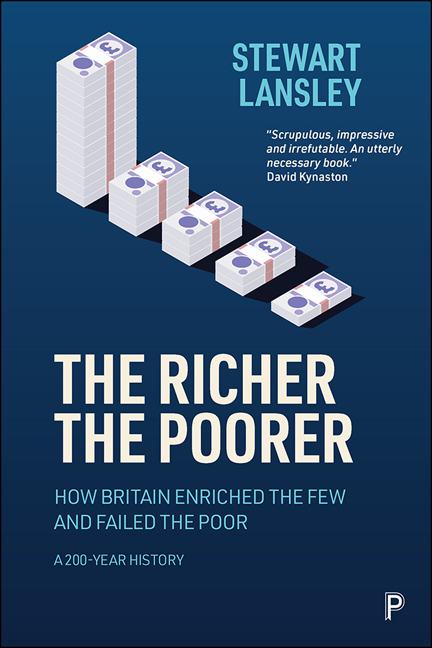Book contents
- Frontmatter
- Miscellaneous Frontmatter
- Dedication
- Epigraph
- Contents
- List of figures
- Preface and acknowledgements
- Introduction: Knighthoods for the rich, penalties for the poor
- PART I 1800–1939
- PART II 1940–59
- PART III 1960–79
- PART IV 1980–96
- PART V 1997–2010
- PART VI 2011–20
- Afterword: COVID-19 and ‘the polo season’
- Notes
- Index
- Frontmatter
- Miscellaneous Frontmatter
- Dedication
- Epigraph
- Contents
- List of figures
- Preface and acknowledgements
- Introduction: Knighthoods for the rich, penalties for the poor
- PART I 1800–1939
- PART II 1940–59
- PART III 1960–79
- PART IV 1980–96
- PART V 1997–2010
- PART VI 2011–20
- Afterword: COVID-19 and ‘the polo season’
- Notes
- Index
Summary
By 1980, Britain was facing a further surge in inflation and in unemployment. If the flagging capitalist patient was to be revived, Mrs Thatcher believed, the medicine had to be taken, and in multiple doses. As they were unimportant, the side-effects on inequality and poverty could be ignored. There was a new emphasis on the ‘micro’ over the ‘macro’, while a new ‘supply-side economics’ promised to raise economic efficiency. Faster deindustrialisation aimed to push Britain more quickly down the road of a finance-and service-driven economy, a new war on unions and business regulation set out to empower boardrooms, while spending on the welfare state was to be reined back.
Inflation –at 17 per cent by the end of 1979 –had to be dealt with, but became the overriding goal, while the post-war commitment to full employment was dropped. The UK and US governments greatly tightened the mild fiscal and monetary restraint introduced by the Callaghan and Carter administrations. Monetarism –the belief that controlling the supply of money was the key to economic stability –was seen as a way of imposing economic discipline, but was applied with what one commentator called ‘a wilful application of fuel on fire’. The medicine worked eventually. Inflation took until 1986 to fall below 5 per cent, but not without subjecting the patient to a series of deeply unpleasant, prolonged and predictable side-effects. Moreover, although there was eventual control over the price of goods and services, this was not the case with an equally damaging asset price inflation.
The unforgiving cocktail of change plunged the UK (and US) economies into their second recession in a decade. It also brought bad news for companies, at least initially. At its trough in 1981, the aggregate valuation of the top 100 UK companies was lower than it had been, adjusted for inflation, at the time of Dunkirk. The radical economist Andrew Glyn used to joke to his Oxford students that British capitalists had been more optimistic about the future of UK companies on the eve of the expected invasion of Britain by Hitler than they were during the early years of Margaret Thatcher's government.
The most visible effect of full-blooded monetarism was on the length of the dole queue. In 1981, unemployment broke through the three million barrier for the first time since the 1930s.
- Type
- Chapter
- Information
- The Richer, the PoorerHow Britain Enriched the Few and Failed the Poor: A 200-Year History, pp. 124 - 132Publisher: Bristol University PressPrint publication year: 2021



